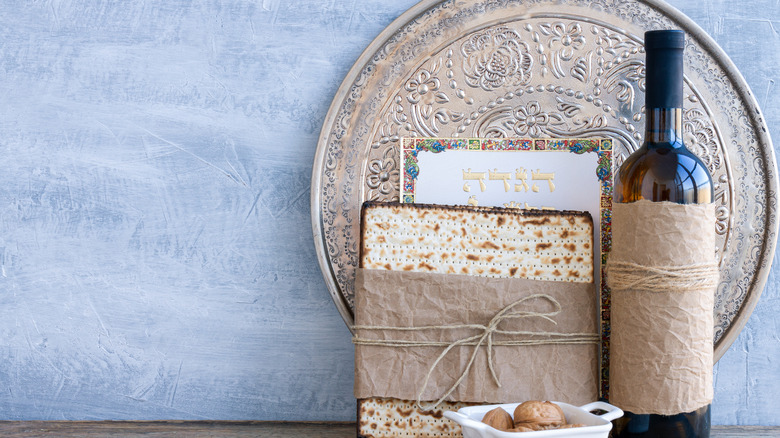What It Actually Means When Wine Is Kosher
Wine is present on just about every special occasion, so it would stand to reason that it would be served during religious events, too. Wine is especially essential in the Jewish tradition and during the Passover Seder, which marks Israel's flight from Egypt. During the Passover dinner, every adult at the table is asked to drink four cups of wine, per The Washington Post. And if you are a practicing Jew, the wines consumed during this important meal must be kosher.
In the United States, all kosher foods, including wine, are labeled as such. Kosher items come with a label displaying a U nestled inside a circle. Some wines might even have a P, which The Washington Post says is a sign that wine won't contain any potential extras like yeast and fining agents, which, if not kosher, are also frowned upon and cannot be consumed during Passover (via Decanter).
Without a label, there is no easy way to tell if a wine is kosher. Covenant Winery founder Jeff Morgan, who makes a range of kosher wines, says, "Kosher wine can be made exactly like non-kosher wine. The only real difference is that a kosher wine must be handled by sabbath-observant Jews from when the grapes arrive in the winery until bottling." Even with that level of care, a bottle can cease to be kosher if it is handled by anyone who does not practice Sabbath.
Kosher wines are not too different from regular wines
Apart from the strict care and handling guidelines involved in their production, kosher wines aren't too different from a regular bottle of red or white. As writer Howard G Goldberg notes in Decanter, "Because standard kashruth [kosher] practices in the vineyard and cellar coincide with universal vineyard and cellar methods, it is relatively easy to produce high quality, competitive kosher wines in idiosyncratic and preferred standardized styles."
Vinepair concedes that there are more than a few preconceived notions about what kosher wines are and aren't, including the idea that all kosher wines are sweet. This idea came about because Concorde grapes were the only varietal available in the U.S. that could be used to make wine for a certain period of time. In the last 20 years or so, kosher wines have been made with different types of grapes to produce a range of wines that are at par with regular wines.
Some also believe that kosher wines are "boiled" before bottled, which The Washington Post's Dave McIntyre says isn't true. However, he clarifies that certain types of kosher wines are heat-treated to 185 degrees, which allows this type of wine, known as mevushal, to stay kosher even if non-observant people touch it. These heat-treated bottles are the ones that you may often see served in places like restaurants or during parties.

